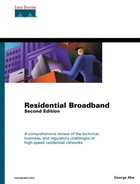Case Study
Most industry observers have long believed that residential broadband is largely a high-income, urban phenomenon. There is relatively little buildout of cable, xDSL, or even wireless local loop solutions for the inner cities or rural towns. This paucity has created discussions of the nature of universal service and whether it applies to broadband services as well as traditional voice services.
But despite the problems of rolling out service to rural America, there are exceptions. An interesting case in point is in Glasgow, Kentucky, population 14,000, located on the Kentucky-Tennessee border in the foothills of the Appalachian Mountains. The case of Glasgow offers lessons and presents an important policy question.
In 1985, the municipal power company, the Glasgow Electric Plant Board, decided to go into the cable TV business to give a little competition to the incumbent cable operator who was not enjoying high customer satisfaction at that time. Glasgow Electric decided to do this by overbuilding—that is, laying their own cable in parallel with the existing cable infrastructure. Their intent was to offer standard analog cable TV.
Despite litigation, predatory pricing, and continued competition from the incumbent, Glasgow Electric was capable of rolling out a municipally owned service and, to this day, maintains more than 60 percent of market share for cable TV. This despite the fact that their prices are higher than the incumbent's and that the staff still works on electricity distribution.
After the rollout of cable TV service, there was another opportunity in the early 1990s to expand service. Glasgow discovered the Internet, and before almost every other city in the United States, Glasgow Electric offered high-speed data service over its cable system. As of this writing, 15 percent of Glasgow Electric's cable subscribers purchase high-speed data service, probably the highest take rate of any system in the country.
Three lessons are learned: First, RBB is not necessarily a high-income urban phenomenon.
Second, a full set of services (electric utility, entertainment video, and Internet access) with lots of customer interaction can overcome a pricing disadvantage, even in small towns. Telephone companies and cable operators shudder at the thought of rolling a truck to the customer site; truck rolls can cost more than $50 each. But Glasgow views truck rolls as opportunities to provide high-touch customer contact, which people like and will pay for.
Finally, Glasgow emphasizes the importance of local content. Mass media content requires some element of local news, weather, and gossip. Popular shows in Glasgow are Little League games and, interestingly, small claims court—even showing tapes of small claims court works. Personalized content is why chat rooms work and why telephone service works.
The policy question raised by Glasgow is that systems like theirs are threatened by statutes enacted by states (Texas being the most prominent among them) that expressly forbid municipalities and related entities from offering telecommunications services. Excess government is the reasoning, but one would suspect a dose of big company lobbying as well.
However, users in small towns normally don't attract big company or even little company interest in providing advanced services. Those citizens may have no recourse but to do it themselves through their local municipal authorities. The matter has gone to court, and so far the states have been upheld and the FCC has elected not to intervene on the behalf of municipalities, on the theory that a dispute between a state and its municipalities is strictly a state matter.
Visit Glasgow at www.glasgow-ky.com .
